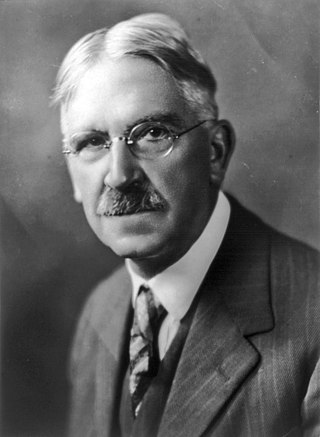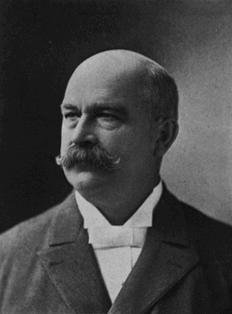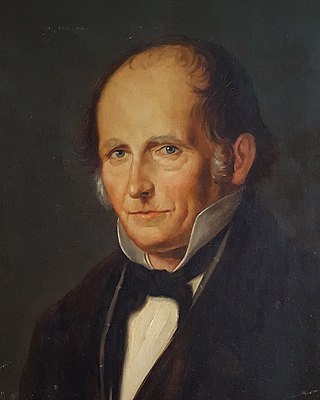Related Research Articles
Progressive education, or educational progressivism, is a pedagogical movement that began in the late 19th century and has persisted in various forms to the present. In Europe, progressive education took the form of the New Education Movement. The term progressive was engaged to distinguish this education from the traditional curricula of the 19th century, which was rooted in classical preparation for the early-industrial university and strongly differentiated by social class. By contrast, progressive education finds its roots in modern, post-industrial experience. Most progressive education programs have these qualities in common:
Educational psychology is the branch of psychology concerned with the scientific study of human learning. The study of learning processes, from both cognitive and behavioral perspectives, allows researchers to understand individual differences in intelligence, cognitive development, affect, motivation, self-regulation, and self-concept, as well as their role in learning. The field of educational psychology relies heavily on quantitative methods, including testing and measurement, to enhance educational activities related to instructional design, classroom management, and assessment, which serve to facilitate learning processes in various educational settings across the lifespan.

John Dewey was an American philosopher, psychologist, and educational reformer. He was one of the most prominent American scholars in the first half of the twentieth century.
Psychometrics is a field of study within psychology concerned with the theory and technique of measurement. Psychometrics generally covers specialized fields within psychology and education devoted to testing, measurement, assessment, and related activities. Psychometrics is concerned with the objective measurement of latent constructs that cannot be directly observed. Examples of latent constructs include intelligence, introversion, mental disorders, and educational achievement. The levels of individuals on nonobservable latent variables are inferred through mathematical modeling based on what is observed from individuals' responses to items on tests and scales.

Edward Lee Thorndike was an American psychologist who spent nearly his entire career at Teachers College, Columbia University. His work on comparative psychology and the learning process led to his "theory of connectionism" and helped lay the scientific foundation for educational psychology. He also worked on solving industrial problems, such as employee exams and testing.

James Mark Baldwin was an American philosopher and psychologist who was educated at Princeton under the supervision of Scottish philosopher James McCosh and who was one of the founders of the Department of Psychology at Princeton and the University of Toronto. He made important contributions to early psychology, psychiatry, and to the theory of evolution.

Johann Friedrich Herbart was a German philosopher, psychologist and founder of pedagogy as an academic discipline.

Pedagogy, most commonly understood as the approach to teaching, is the theory and practice of learning, and how this process influences, and is influenced by, the social, political, and psychological development of learners. Pedagogy, taken as an academic discipline, is the study of how knowledge and skills are imparted in an educational context, and it considers the interactions that take place during learning. Both the theory and practice of pedagogy vary greatly as they reflect different social, political, and cultural contexts.
School psychology is a field that applies principles from educational psychology, developmental psychology, clinical psychology, community psychology, and behavior analysis to meet the learning and behavioral health needs of children and adolescents. It is an area of applied psychology practiced by a school psychologist. They often collaborate with educators, families, school leaders, community members, and other professionals to create safe and supportive school environments.

Francis Wayland Parker was a pioneer of the progressive school movement in the United States. He believed that education should include the complete development of an individual — mental, physical, and moral. John Dewey called him the "father of progressive education." He worked to create curriculum that centered on the whole child and a strong language background. He was against standardization, isolated drill and rote learning. He helped to show that education was not just about cramming information into students' minds, but about teaching students to think for themselves and become independent people.
Seymour Bernard Sarason was Professor of Psychology Emeritus at Yale University, where he taught from 1945 to 1989. He is the author of over forty books and over sixty articles, and he is considered to be one of the most significant American researchers in education, educational psychology, and community psychology. One primary focus of his work was on education reform in the United States. In the 1950s he and George Mandler initiated the research on test anxiety. He founded the Yale Psycho-Educational Clinic in 1961 and was one of the principal leaders in the community psychology movement. In 1974, he proposed psychological sense of community, a central concept in community psychology. Since then, sense of community has become a well-known and commonly used term both in academic and non-academic settings.
Curriculum theory (CT) is an academic discipline devoted to examining and shaping educational curricula. There are many interpretations of CT, being as narrow as the dynamics of the learning process of one child in a classroom to the lifelong learning path an individual takes. CT can be approached from the educational, philosophical, psychological and sociological perspectives. James MacDonald states "one central concern of theorists is identifying the fundamental unit of curriculum with which to build conceptual systems. Whether this be rational decisions, action processes, language patterns, or any other potential unit has not been agreed upon by the theorists." Curriculum theory is fundamentally concerned with values, the historical analysis of curriculum, ways of viewing current educational curriculum and policy decisions, and theorizing about the curricula of the future.

William Heard Kilpatrick was an American pedagogue and a pupil, a colleague and a successor of John Dewey. Kilpatrick was a major figure in the progressive education movement of the early 20th century.

George Sylvester Counts was an American educator and influential education theorist.

Democracy and Education: An Introduction to the Philosophy of Education is a 1916 book by John Dewey.

James Lockhart Mursell wrote extensively about music education and the use of music in a classroom setting. He emphasized the student's role in learning and believed that unless students are intrinsically motivated to learn, their musical growth will be minimal at best. In Mursell's view, the best motivator is the active, participatory musical experience — singing, playing, listening and being actively involved with good music. This is the all-important starting point for motivation, and it is from these experiences that musical growth can occur.

Friedrich Adolph Wilhelm Diesterweg was a German educator, thinker, and progressive liberal politician, who campaigned for the secularization of schools. He is said to be precursory to the reform of pedagogy. Diesterweg is considered as "a teacher of teachers".
The Forum was an American magazine founded in 1885 by Isaac Rice. It existed under various names and formats until it ceased publication in 1950. Published in New York, its most notable incarnation was symposium based. Articles from prominent guest authors debated all sides of a contemporary political or social issue, often across several issues and in some cases, several decades. At other times, it published fiction and poetry, and published articles produced by staff columnists in a "news roundup" format.
Herbartianism (Her-bart-ti-an-ism) is an educational philosophy, movement, and method loosely based on the educational and pedagogical thought of German educator Johann Friedrich Herbart, and influential on American school pedagogy of the late 19th century as the field worked towards a science of education. Herbart advocated for instruction that introduced new ideas in discrete steps. About a quarter-century after his death, Herbart's ideas were expanded in two German schools of thought that were later embodied in the method used at a practice school in Jena, which attracted educationists from the United States. Herbartianism was later replaced by new pedagogies, such as those of John Dewey.
Herbert M. Kliebard was an American historian of education, and professor at the University of Wisconsin–Madison. He is best known for his 1995 book, The Struggle for the American Curriculum.
References
- 1 2 3 Graham, Patricia Albjerg (1966). "Joseph Mayer Rice as a Founder of the Progressive Education Movement". Journal of Educational Measurement. 3 (2): 129–133. doi:10.1111/j.1745-3984.1966.tb00868.x. ISSN 0022-0655. JSTOR 1433887.
- 1 2 3 4 "Rice, Joseph Mayer (1857-1934), physician, journal editor, and education critic". American National Biography. Retrieved 2024-12-12.
- ↑ Fayol, Michel; Alamargot, M. Denis; Berninger, Virginia Wise (2012). Translation of Thought to Written Text While Composing: Advancing Theory, Knowledge, Research Methods, Tools, and Applications. Psychology Press. p. 28. ISBN 978-1-84872-920-9 . Retrieved March 22, 2015.
- ↑ Berube, Maurice R. (January 1, 1994). American School Reform: Progressive, Equity, and Excellence Movements, 1883-1993. Greenwood Publishing Group. p. 16. ISBN 978-0-275-95036-1 . Retrieved March 22, 2015.
- ↑ Rice, J.M. (1983). The Public-School System of the United States (1893). New York: Arno Press and the New York Times. Made available as an e-book by the University of Toronto, Robarts Library.
- ↑ Rice, J.M. (1898). The Rational Spelling Book. New York: American Book Company. Made available as an e-book by the University of California Libraries.
- ↑ Rice, J.M. (1913). Scientific Management in Education. New York: Publishers Printing Company. Made available as an e-book by the Library of Congress and the Sloan Foundation.
- ↑ Rice, J.M. (1915). The People's Government. Philadelphia, PA: The John C. Winston Company. Made available as an e-book by the Library of Congress.
- ↑ Kliebard, Herbert M. (2004). The Struggle for the American Curriculum, 1893–1958 (3rd Kindle ed.). New York and London: Routledge. pp. 599–645 (Kindle locations). ISBN 0415948908.
- ↑ Johanningmeier, Erwin V.; Richardson, Theresa (2008). Educational research, the national agenda, and educational reform : a history. Charlotte, N.C.: IAP-Information Age Pub. p. 30. ISBN 978-1593117306.
- ↑ Special to THE NEW YORK TIMES (1934, June 25)."DR. JOSEPH M. RICE, AUTHOR, DIES AT 77: Retired Educator, Writer and Physician Is Stricken in Philadelphia Hospital." New York Times, p. 15. New York, N.Y., United States.